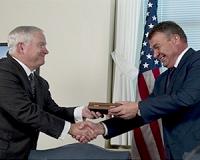| . |  |
. |
Brasilia, Brazil (UPI) Sep 16, 2010 Brazil is opposed to any NATO presence in the South Atlantic or any attempt to forge links between the north and the south of the oceanic region, senior Brazilian government aides said. Brazil's expected rebuff to any European or North American overtures coincided with pronouncements by Brazil, Argentina and other regional states they see the oil-rich southern oceanic territories as their strategic backyard. This week Argentina announced plans for drilling for hydrocarbons in its southern-most waters, near the narrow Magellan Strait, which connects Atlantic and Pacific oceans. Brazil's Petrobras is part of an Argentine-led consortium expected to conduct the drilling operations. Senior Argentine officials said they regard the region as the country's "soft underbelly" while continuing to oppose British-backed drilling for oil in the Falklands Basin further afield, southeast of Argentina. Earlier in the year, Latin American leaders met to discuss joint security arrangements -- and military integration farther into the future -- that pointedly excluded the United States and Canada from the deal. Current talks between the European Union and South America's Mercosur trade bloc are also geared toward creating an interdependent commercial bridge that will give Mercosur clout in the EU commodity markets while affording cash-strapped Europeans a share of the Latin American member-countries' import boom. Mercosur's import requirements are on the rise as its annual gross domestic product of more than $1 trillion increases in response to growth and prosperity. Brazilian Defense Minister Nelson Jobim made clear his country would oppose any inroads by NATO or its members. Having a NATO presence in the South Atlantic region would be "inappropriate," Jobim said in comments quoted by Brazilian media. Jobim made the comment during an address at the Lisbon Defense Institute in Portugal during his current European tour. "Security measures for each side of the Atlantic Ocean are very different from each other," he said, in a follow-up to previous comments opposing NATO, specifically U.S., moves in the area. Despite good Brazil-U.S. ties, Brazil hasn't hesitated in voicing its opposition to large-scale U.S. naval presence in the South Atlantic. Brazil wants its regional pre-eminence recognized through a permanent seat on the U.N. Security Council, for which President Luiz Inacio "Lula" da Silva has been lobbying members of the world body. In 2008 Lula da Silva launched a major military regeneration program. He has announced plans to revive defense manufacturing, a major earner during the 1980s military dictatorship years. The buildup in one oil discovery after another in Brazil's waters has also fed into Brasilia's strategic concerns and the country's political ambitions, as indicated by the decision to increase Brazil's offshore frontier to 350 nautical miles. Ever a pragmatist, Lula da Silva indicated this week he backed equal partnerships. A new British-Brazilian agreement calls for defense cooperation in a spectrum of related sectors, including joint military production, technology transfers, education and training.
Share This Article With Planet Earth
Related Links Learn about the Superpowers of the 21st Century at SpaceWar.com Learn about nuclear weapons doctrine and defense at SpaceWar.com
 US, Russian defense chiefs promote deeper ties
US, Russian defense chiefs promote deeper tiesWashington (AFP) Sept 15, 2010 Defense Secretary Robert Gates on Wednesday hosted his Russian counterpart Anatoly Serdyukov in a high-profile visit symbolizing a "reset" in US-Russia ties. Both men vowed to expand military cooperation as they marked the first visit to the Pentagon by a Russian defense minister in more than five years. The full-day of talks reflected how relations between the former Cold War foes have ... read more |
|
| The content herein, unless otherwise known to be public domain, are Copyright 1995-2010 - SpaceDaily. AFP and UPI Wire Stories are copyright Agence France-Presse and United Press International. ESA Portal Reports are copyright European Space Agency. All NASA sourced material is public domain. Additional copyrights may apply in whole or part to other bona fide parties. Advertising does not imply endorsement,agreement or approval of any opinions, statements or information provided by SpaceDaily on any Web page published or hosted by SpaceDaily. Privacy Statement |